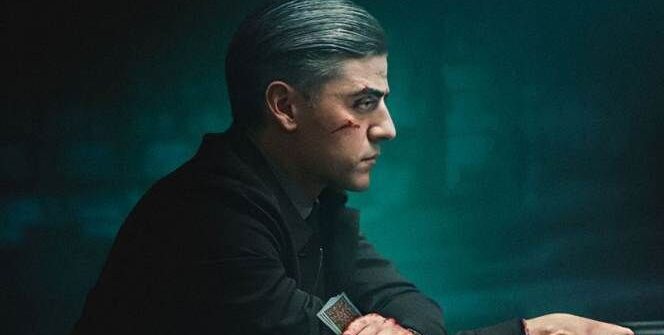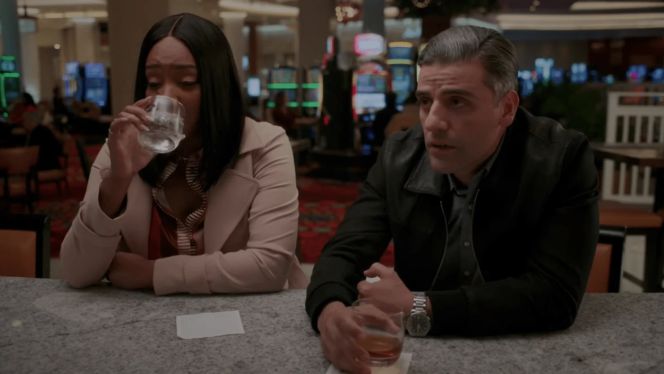MOVIE REVIEW – The Card Counter isn’t just another card movie, contrary to its title. Paul Schrader’s hypnotic, slow-moving, minimalist thriller is really about PTSD, deep guilt and a strange kind of atonement, starring the formidable professional Oscar Isaac, at the top of his game, as a psychologically tormented, only seemingly calm professional gambler.
The protagonist of The Card Counter is a very familiar character. In the lead role is an intense and deeply relatable Oscar Isaac, who plays a character called William Tell (or pseudonym, of course): a man who has just been released from prison and, as the original English title of the title suggests (The Card Counter), is learning to count cards on the inside.
The Samurai – with a new approach
Like Ethan Hawke in First Reformed, and before him, his predecessor Robert De Niro in Taxi Driver, Tell shares his most intimate thoughts to the audience through his diary. Tell seems to be in control of his destiny and his spiritual decline, and he just wants to play cards and win in peace. In reality, however, his inner demons and dark memories of his past are gradually, silently, slowly consuming him – without the outside world being aware of it. Just as in the aforementioned Taxi Driver, the man in severe psychological and existential crisis, disgusted by the world around him, is sitting on a veritable psychological powder keg that could explode at any moment – but two strange encounters and his new friends offer the possibility of a different path.
Having learned to survive on routine in prison, ritual and discipline mean everything to Tell, including a diligent diary-writing that begins to expose the cracks in his icy, seemingly meticulously crafted facade. Tell, who strictly observes his customs, and the film is equally meticulous in its depiction of these rituals, is a professional gambler who plays at simple parties and American poker tournaments. He lives a monotonous life, travelling from motel to motel, betting and winning modestly, and as a result, he never gets much attention or is pestered by casino managers. He’s like the mysterious samurai of poker, living by a strict code that no one really knows. Still, some, like gambling agent La Linda (Tiffany Haddish) – who wants to do business with him – are very curious about him.
The past haunts him
Tell is forced to confront the ghosts of his past, however, when a young man named Cirk (Tye Sheridan) appears, searching for meaning in his own life after the suicide of his soldier father. Cirk wants revenge on Major John Gordo (Willem Dafoe), who got away with the sordid, cruel torture scandal for which Tell was convicted. Gordo is now a private security consultant, but he was once a true sociopathic soldier who trained Tell and who the young man believes is responsible for his father’s death. After a chance encounter, Cirk exposes Tell, a former military interrogator in Iraq – as the reason for his imprisonment.
Many have paid a heavy price for their sadistic, cruel actions at Abu Ghraib, spiritual, psychological, physical or otherwise. They were scapegoats, like Tell and Cirk’s father, but Gordo not only escaped punishment but also benefited from his past horrific actions. What unfolds is an unlikely story, not of revenge but of possible forgiveness and atonement. Perhaps Tell can atone for his sins by helping to morally and financially set Circe on a new path, mentoring her and ‘making things right. But Tell eventually learns that the troubling shadows of the past will not let him go so easily.
Set in elegant casinos, the unexpectedly shocking scenes are replaced by nightmarish scenes from Abu Ghraib’s past, with a disturbingly wide-angle camera taking us on a tour of the hellish surroundings. We glide through filthy cells where naked prisoners cower helplessly, terrified, wallowing in their own filth. Oscar Isaac’s character is an American prison guard and interrogator whose figure is so distorted by the camera that he appears to have been cut off at the knees.
These scenes are old memories that continue to haunt the character of Isaac, who served eight and a half years after the scandal broke and then became a professional gambler, calling himself William Tell. Years before assuming this amusing pseudonym, he was a soldier stationed at Abu Ghraib, where he took part in the torture and interrogation of prisoners. He was eventually court-martialled and imprisoned in Leavenworth, a much nicer prison than the last garrison; behind bars, he found strange comfort reading books, broadening his mind and learning to count cards. Now that he’s back on the outside, William spends his days going from casino to casino, playing just smart enough to win a relatively handsome sum but not too much to attract the attention of the casino management. This routine suits him and keeps him busy. Of course, his demons have not left him, but he keeps them at bay with this internal distraction.
Isaac is at the top…
Schrader’s story, however, seeks to lure these demons back out into the open, to take his antihero, who is struggling with serious conflicts, through his own intensely personal yet strangely familiar crossroads. Like some of the filmmaker’s other charismatically brooding sinners – Willem Dafoe’s crisis-stricken drug dealer in A Light Dream or Ethan Hawke’s equally remorseful pastor in The Apostate – William likes to sit alone in his room at night, sipping a glass of booze and pouring his dark thoughts into a handwritten journal, from which he reads a few helpful, explanatory passages.
But for all the apparent similarities, William is fundamentally different – thanks to one of Oscar Isaac’s richest, most subtle performances, for which he deserves an Oscar. (Nomen est omen…) Tell is only on the surface an infinitely calm, stoic figure who never shows his cards; at other times, when he is in despair or forced to step out of his comfort zone and deal with his emotions, he is most often a desperate or frightening, aggressive figure. Still, he shows his emotional, romantic, or empathetic side in certain scenes. And what is particularly impressive about Isaac’s performance is his portrayal of the different layers of his state of mind and the process of gradually shedding them.
…and Dafoe is again haunting
Dafoe is barely on screen, but every second of his illuminated portrait is haunting, a marriage of sight and stillness that suggests something profoundly evil and sinister. And Sheridan is utterly convincing as the desperate, initially vengeful, but still at heart aimless, naive kid. He’s a genuinely tragic and heartbreaking character – who hasn’t really thought through the possible price he might pay if he goes through with his revenge. The only character who stands out a little at first is Tiffany Haddish, a businesswoman in the casino world. She doesn’t always fit in well with the character development of the other two characters. She is calculating at first and later becomes more attached to the two men, but it is only towards the very end of the film that we understand what she is doing in this story.
It is also worth mentioning the extremely atmospheric music score by Giancarlo Vulcano and Robert Levon Been (Black Rebel Motorcycle Club), which adds a lot to the already great atmosphere of the film.
The Card Counter may not be for everyone, but if you are willing to immerse yourself in this unique, slow-building film drama about a guilt-ridden card player struggling with his inner demons, starring Oscar Isaac in an incredibly professional performance, you will be in for a hypnotic, hypnotic, both shocking and thought-provoking cinematic experience with an extraordinary story.
-BadSector-
The Card Counter
Direction - 9.2
Actors - 9.4
Story - 9.2
Visuals/Music/Sounds - 9.6
Ambience - 9.5
9.4
AWESOME
The Card Counter may not be for everyone, but if you are willing to immerse yourself in this unique, slow-building film drama about a guilt-ridden card player struggling with his inner demons, starring Oscar Isaac in an incredibly professional performance, you will be in for a hypnotic, hypnotic, both shocking and thought-provoking cinematic experience with an extraordinary story.


















Leave a Reply